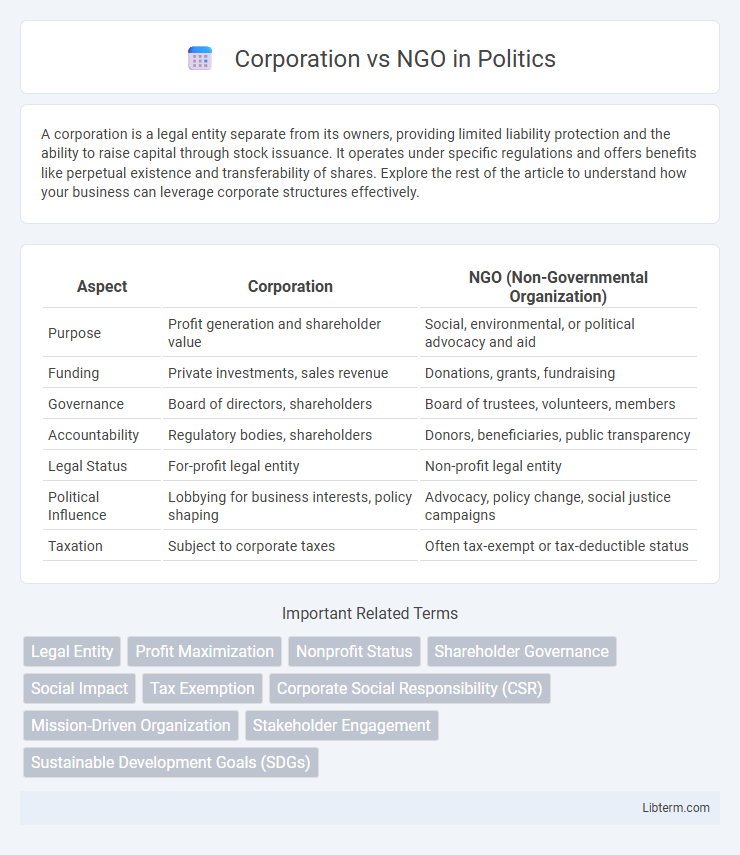A corporation is a legal entity separate from its owners, providing limited liability protection and the ability to raise capital through stock issuance. It operates under specific regulations and offers benefits like perpetual existence and transferability of shares. Explore the rest of the article to understand how your business can leverage corporate structures effectively.
Table of Comparison
| Aspect | Corporation | NGO (Non-Governmental Organization) |
|---|---|---|
| Purpose | Profit generation and shareholder value | Social, environmental, or political advocacy and aid |
| Funding | Private investments, sales revenue | Donations, grants, fundraising |
| Governance | Board of directors, shareholders | Board of trustees, volunteers, members |
| Accountability | Regulatory bodies, shareholders | Donors, beneficiaries, public transparency |
| Legal Status | For-profit legal entity | Non-profit legal entity |
| Political Influence | Lobbying for business interests, policy shaping | Advocacy, policy change, social justice campaigns |
| Taxation | Subject to corporate taxes | Often tax-exempt or tax-deductible status |
Introduction to Corporations and NGOs
Corporations are legally recognized entities designed to conduct business activities, generate profit, and protect shareholders' interests through limited liability. Non-Governmental Organizations (NGOs) operate as nonprofit entities focused on social, environmental, or humanitarian goals, relying on funding from donations, grants, and volunteers. Both corporations and NGOs possess distinct legal structures and operational frameworks aligning with their core objectives and stakeholder expectations.
Defining Characteristics of Corporations
Corporations are legally recognized entities that separate ownership from management, typically characterized by limited liability, perpetual existence, and the ability to issue shares of stock. They operate to generate profit for shareholders, governed by a board of directors and subject to corporate laws and regulations. Unlike NGOs, corporations prioritize financial returns and market competitiveness, relying on capital investment and structured governance to drive growth and sustainability.
Core Attributes of NGOs
NGOs operate as nonprofit entities focused on social, environmental, or humanitarian goals, prioritizing public benefit rather than profit generation. Their governance typically involves a board of directors or trustees who ensure transparency, accountability, and mission-driven activities. Funding sources for NGOs predominantly include donations, grants, and volunteer support, contrasting with corporations that rely on sales revenue and investments.
Primary Objectives and Missions
Corporations primarily aim to maximize shareholder value through profit generation and market expansion, focusing on financial performance and competitive advantage. NGOs concentrate on social, environmental, or humanitarian goals, prioritizing public welfare and advocacy over financial gain. The fundamental difference lies in corporations pursuing economic objectives, while NGOs are mission-driven to address societal needs.
Legal and Organizational Structures
Corporations operate under corporate law with a hierarchical structure prioritizing shareholder profit, while NGOs follow nonprofit legal frameworks emphasizing mission-driven goals without equity ownership. Corporations issue shares and have boards accountable to shareholders, whereas NGOs rely on members or trustees managing resources aligned with social or environmental causes. Legal compliance for corporations involves financial reporting focused on profit, contrasting with NGOs' obligation to maintain transparency in fundraising and program impact.
Funding Sources and Financial Models
Corporations primarily generate funding through sales revenue, investments, and shareholder equity, relying on profit-driven financial models to sustain operations and growth. NGOs depend on donations, grants, and government funding, often adopting a non-profit financial model focused on transparency, accountability, and reinvestment into mission-driven activities. While corporations prioritize maximizing shareholder value, NGOs emphasize financial sustainability aligned with social or environmental objectives.
Impact on Society and Sustainable Development
Corporations drive economic growth by creating jobs, generating tax revenues, and fostering innovation, significantly influencing sustainable development through responsible environmental practices and corporate social responsibility initiatives. NGOs primarily focus on social welfare, environmental conservation, and human rights, directly addressing community needs and advocating for policy changes that promote long-term sustainability. Both entities play complementary roles, with corporations enabling resource allocation and technological advancement, while NGOs ensure equitable social impact and environmental stewardship.
Governance and Accountability Mechanisms
Corporations implement governance structures centered on a board of directors responsible for maximizing shareholder value and ensuring regulatory compliance, often utilizing performance metrics and financial audits to maintain accountability. NGOs operate governance through boards or committees emphasizing mission alignment, stakeholder engagement, and transparency, using impact assessments and public reporting to demonstrate accountability. Both entities rely on distinct mechanisms tailored to their objectives: corporations focus on profitability and shareholder interests, while NGOs prioritize social outcomes and ethical stewardship.
Collaboration and Interaction Between Corporations and NGOs
Collaboration between corporations and NGOs leverages corporate resources and NGO expertise to address social and environmental challenges effectively. Strategic partnerships often include joint initiatives in sustainability, community development, and corporate social responsibility, enhancing impact and credibility for both entities. Transparent communication and shared goals drive successful interactions, fostering innovation and long-term positive outcomes in global and local contexts.
Key Differences and Comparative Analysis
Corporations are profit-driven entities structured to generate revenue for shareholders, operating under commercial laws with a focus on market competition and financial growth. NGOs, or non-governmental organizations, prioritize social, environmental, or humanitarian goals without profit motives, functioning under nonprofit laws and relying on donations, grants, and volunteer efforts. Key differences include their legal frameworks, funding sources, accountability mechanisms, and primary objectives, with corporations emphasizing profit maximization, while NGOs focus on public benefit and social impact.
Corporation Infographic

 libterm.com
libterm.com